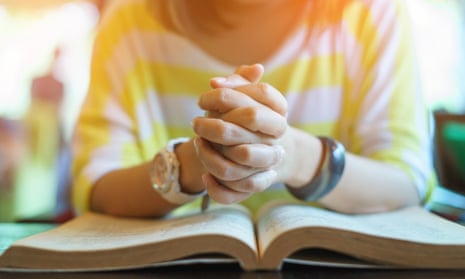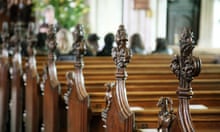All things have a price – and if not, economists will find one. Researchers have calculated the going rate for thoughts and prayers offered in hard times.
Rather than settling on one price for all, the study found the value of a compassionate gesture depended overwhelmingly on a person’s beliefs. While Christian participants were willing to part with money to receive thoughts and prayers from others, the idea made nonbelievers baulk. Instead of shelling out to receive the gestures, on average they were willing to pay to avoid them.
Linda Thunström, an economist and an author of the study at the University of Wyoming, said: “That was a big surprise. Atheists and agnostics are actually willing to give up money to avoid people’s thoughts and prayers.”
Thunström and Shiri Noy, a sociologist at Denison University in Ohio, decided to put a value on “thoughts and prayers” to help understand the backlash that often follows when prominent figures express their sympathies to communities affected by catastrophes such as mass killings and natural disasters. To some critics, the words are meaningless and at worst detract from practical action that might help prevent further disasters.
The study, published in the journal Proceedings of the National Academy of Sciences, focused on 436 residents of North Carolina, the state most affected by Hurricane Florence last year. The participants were given $5 (£4) “in support of their hardship” and asked how much, if any, they were willing to exchange to receive thoughts and prayers from strangers, most of whom were recruited over the internet. When a participant agreed to a price for a gesture, one of the strangers received a note outlining the participant’s struggles and asking them to either pray or have them in their thoughts.
Prayers from a priest were worth $7.17 to the average Christian in need. Prayers from less exalted Christians were valued at $4.36, while mere thoughts from another Christian were cheaper still at $3.27. The researchers used statistical models to estimate prices people would pay above the $5 they had.
Atheists and agnostics, meanwhile, were averse to “thoughts and prayers”. On average, they were willing to pay a priest $1.66 not to pray for them, and more than twice that, $3.54, to ensure a run-of-the-mill Christian similarly refrained.
Public figures increasingly face criticism for their language around tragedies. “It may reflect the political climate we are in,” Thunström said. “Some of these people might feel they hear the phrase ‘thoughts and prayers’ all the time, and perhaps it provokes something in them.”
The Harvard law professor Cass Sunstein, who was the administrator of the Office of Information and Regulatory Affairs under Barack Obama, called the study “a strong and powerful paper”.
In the aftermath of a mass shooting in Las Vegas in 2017, Mark Kelly, the husband of the Arizona Democrat Gabby Giffords, who survived a shooting at a constituent meeting in 2011, railed against politicians for their failure to address what he called an “epidemic” of gun violence in the US.
“What we’re hearing today at the Capitol and the White House are thoughts and prayers,” he said. “Your thoughts and prayers aren’t going to stop the next shooting. Only action and leadership will do that.”
Thunström said: “This work helps us understand the contemporary heated debate about these gestures. What our results show is that they have real value to some people, but not to others. These gestures need to be more targeted. If you are talking to a population that is more dominated by nonbelievers, you might not want to suggest a national prayer day.”









